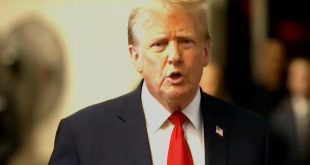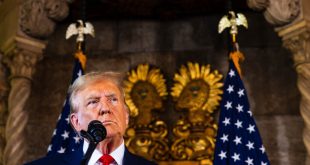WASHINGTON — The 25 richest Americans including Jeff Bezos, Michael Bloomberg and Elon Musk paid relatively little — and sometimes nothing — in federal income taxes between 2014 and 2018, according to an analysis from the news organization ProPublica that was based on a trove of Internal Revenue Service tax data.
The analysis showed that the nation’s richest executives paid just a fraction of their wealth in taxes — $13.6 billion in federal income taxes on $401 billion of their wealth, which was tabulated by Forbes.
The documents reveal the stark inequity in the American tax system, as plutocrats like Mr. Bezos, Mr. Bloomberg, Warren Buffett, Carl Icahn and Mr. Musk were able to benefit from a complex web of loopholes in the tax code and the fact that the United States puts its emphasis on taxing labor income versus wealth. Much of the wealth that the rich accrue — like shares in companies they run, vacation homes, yachts and other investments — isn’t considered “taxable income” unless those assets are sold and a gain is realized. Even then, there are loopholes in the tax code that can limit or erase all tax liability.
The rare window into the tactics of the nation’s top billionaires comes as President Biden is trying to overhaul the tax code so that corporations and the rich pay more. Mr. Biden has proposed raising the top marginal income tax rate to 39.6 percent from 37 percent, which would reverse the reduction ushered in by President Donald J. Trump’s 2017 tax cuts.
But the documents and the conclusions of the analysis could renew calls for Mr. Biden to consider a wealth tax, given that a higher marginal tax rate would do little to raise the tax bills of the 25 richest Americans. From 2014 to 2018, the 25 wealthiest Americans paid an average of 15.8 percent, or $13.6 billion, in personal federal income taxes.
Lawmakers like Senator Elizabeth Warren, Democrat of Massachusetts, have championed the idea of placing a 2 percent tax on an individual’s net worth above $50 million — including the value of stocks, houses, boats and anything else a person owns, after subtracting any debts.
Ms. Warren said on Twitter that the ProPublica report showed “our tax system is rigged for billionaires who don’t make their fortunes through income, like working families do.”
Mr. Biden and his advisers have deemed the idea of a wealth tax unworkable. Instead, he has sought $80 billion to beef up the Internal Revenue Service so it is better able to go after tax cheats. And he has proposed doubling the tax on capital gains — the proceeds of selling an asset like a stock or a boat — for people earning more than $1 million.
At a New York Times DealBook event in February, Treasury Secretary Janet L. Yellen said that a wealth tax is “something that has very difficult implementation problems.” She suggested that other changes that would increase taxes on wealth that is transferred at death could have a similar effect. In March, however, Ms. Yellen suggested that she remained open minded about a wealth tax.
“Well, that’s something that we haven’t decided yet,” Ms. Yellen said on ABC News, before pointing to other tax ideas that would also impact the rich.
ProPublica did not reveal how it obtained the information and it could not be independently verified by The New York Times. But the publication said the documents were provided to the outlet “in raw form, with no conditions or conclusions” and that it had run the information past every executive whose information was included in the article.
“Every person whose tax information is described in this story was asked to comment,” ProPublica said, adding that those who responded “all said they had paid the taxes they owed.”
In a separate editors’ note, the outlet said it was publishing the information “quite selectively and carefully — because we believe it serves the public interest in fundamental ways, allowing readers to see patterns that were until now hidden.”
The report highlights the techniques that the wealthy often use to reduce their tax bills, including taking advantage of a complex web of loopholes and deductions that are perfectly legal and can significantly minimize tax liability. That includes borrowing huge sums of money backed by enormous stock holdings. Loans are not taxed and the interest that the executives pay on the borrowed money can be deducted from their tax bills.
In 2007, Mr. Bezos, the chief executive of Amazon, paid nothing in federal income taxes even as his company’s stock price doubled. Four years later, as his wealth swelled to $18 billion, Mr. Bezos reported losses and received a tax credit of $4,000 for his children, according to ProPublica.
Mr. Buffett, the chief executive of Berkshire Hathaway who has long said publicly that the tax code should hit the rich harder, paid just $23.7 million in taxes from 2014 to 2018, when his wealth rose by $24.3 billion.
In 2018, Mr. Bloomberg, who controls the media giant Bloomberg L.P., reported income of $1.9 billion and paid $70.7 million in income tax. According to the report, Mr. Bloomberg was able to reduce his tax bill through deductions, charitable donations and “credits for having paid foreign taxes.”
In a statement to ProPublica, a spokesman for Mr. Bloomberg said they would “use all legal means at our disposal to determine which individual or government entity leaked these and ensure that they are held responsible.”
The Treasury Department said that the federal government is working to determine how the tax records got released.
“The unauthorized disclosure of confidential government information is illegal,” Lily Adams, a Treasury spokeswoman, said. “The matter is being referred to the Office of the Inspector General, Treasury Inspector General for Tax Administration, Federal Bureau of Investigation, and the U.S. Attorney’s Office for the District of Columbia, all of whom have independent authority to investigate.”
At a Senate Finance Committee hearing where he was testifying on Tuesday, Charles Rettig, the I.R.S. commissioner, said that he could not comment on the apparent breach at his agency but said that it was being scrutinized.
“I can confirm that there is an investigation with respect to the allegations that the source of the information in that article came from the Internal Revenue Service,” Mr. Rettig said. “The investigators will investigate.”
Senator Ron Wyden of Oregon, the chairman of the finance committee, told Mr. Rettig that he was concerned about the security of taxpayer data. He also emphasized that the disclosures made clear that the tax code needs to be rewritten.
“What this data reveals is that the country’s wealthiest, who profited immensely during the pandemic, have not been paying their fair share,” Mr. Wyden said, adding that he has proposals to fix that disparity.
After the hearing, Mr. Wyden declined to offer specifics about his plan to address the issue, but emphasized his concern about unfairness in the tax code.
“The people I represent are doing work, like treating Covid patients, they’re paying taxes with every paycheck,” Mr. Wyden said. “The country’s wealthiest, including during the pandemic, profited handsomely and then do not pay their fair share because they have figured out with good lawyers and accountants how to defer and delay and postpone and almost do it in perpetuity.”
Senator Mike Crapo of Idaho, the top Republican on the committee, said that the disclosures added to his concern about a Biden administration proposal to give the I.R.S. more access to the financial information of taxpayers. He suggested that the agency could not be trusted to keep the data secure.
The president said on Twitter on Tuesday that he was continuing to work with Republicans on infrastructure and jobs legislation and said that he would not seek a tax increase on anyone who earns less than $400,000.
“It’s long past time the wealthy and corporations pay their fair share,” Mr. Biden said.
Emily Cochranecontributed reporting.
 Top Naija News: Nigerian News, Breaking News Nigeria and World News Top Naija News is a daily news publication in Nigeria, delivering the latest breaking news in Nigeria and around the world.
Top Naija News: Nigerian News, Breaking News Nigeria and World News Top Naija News is a daily news publication in Nigeria, delivering the latest breaking news in Nigeria and around the world.



